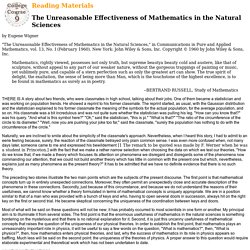

Poe's Law. On Math. Reading Materials by Eugene Wigner "The Unreasonable Effectiveness of Mathematics in the Natural Sciences," in Communications in Pure and Applied Mathematics, vol. 13, No.

I (February 1960). New York: John Wiley & Sons, Inc. Copyright © 1960 by John Wiley & Sons, Inc. Mathematics, rightly viewed, possesses not only truth, but supreme beautya beauty cold and austere, like that of sculpture, without appeal to any part of our weaker nature, without the gorgeous trappings of painting or music, yet sublimely pure, and capable of a stern perfection such as only the greatest art can show. THERE IS A story about two friends, who were classmates in high school, talking about their jobs.
Naturally, we are inclined to smile about the simplicity of the classmate's approach. The preceding two stories illustrate the two main points which are the subjects of the present discourse. The complex numbers provide a particularly striking example for the foregoing. Let me end on a more cheerful note. Ten games that make you think about life. At the start of this year, we decided to come up with a list of Flash casual games with a philosophical bent.

To be honest, we struggled. After days of research, we could only find a handful of games that had the thought-provoking depth we were looking for. Our list (which you can view by clicking here) was therefore only five games long. Fast forward to now, and it is remarkable how much difference a few months can make. Thanks to the work of pioneers like Daniel Benmergui, Gregory Weir and PixelAnte, there is now an abundance of clever arty Flash games to pique our intellects, and as a result creating this follow-up list of games that make you think has been a doddle.
In a wonderful twist, it seems it is the Flash gaming space - until now known more for the throwaway nature of its games rather than depth - that is leading the way in this exciting new area of gaming, as we hope the following games prove. 1Immortall The game starts with you crash landing on a planet. 2Loved 5Coma 6Loondon.
Infinite monkey theorem. The infinite monkey theorem states that a monkey hitting keys at random on a typewriter keyboard for an infinite amount of time will almost surely type a given text, such as the complete works of William Shakespeare. In this context, "almost surely" is a mathematical term with a precise meaning, and the "monkey" is not an actual monkey, but a metaphor for an abstract device that produces an endless random sequence of letters and symbols. One of the earliest instances of the use of the "monkey metaphor" is that of French mathematician Émile Borel in 1913,[1] but the earliest instance may be even earlier. The relevance of the theorem is questionable—the probability of a universe full of monkeys typing a complete work such as Shakespeare's Hamlet is so tiny that the chance of it occurring during a period of time hundreds of thousands of orders of magnitude longer than the age of the universe is extremely low (but technically not zero).
Solution[edit] Direct proof[edit] Infinite strings[edit]
Faith. The Ten Most Revealing Psych Experiments. Psychology is the study of the human mind and mental processes in relation to human behaviors - human nature.

Due to its subject matter, psychology is not considered a 'hard' science, even though psychologists do experiment and publish their findings in respected journals. Some of the experiments psychologists have conducted over the years reveal things about the way we humans think and behave that we might not want to embrace, but which can at least help keep us humble.
That's something. 1. 'Lord of the Flies': Social Identity Theory The Robbers Cave Experiment is a classic social psychology experiment conducted with two groups of 11-year old boys at a state park in Oklahoma, and demonstrates just how easily an exclusive group identity is adopted and how quickly the group can degenerate into prejudice and antagonism toward outsiders. Researcher Muzafer Sherif actually conducted a series of 3 experiments. 2. 3. 4. 5. 6. 7. 8. 9. 10. Turns out that it's all about framing.